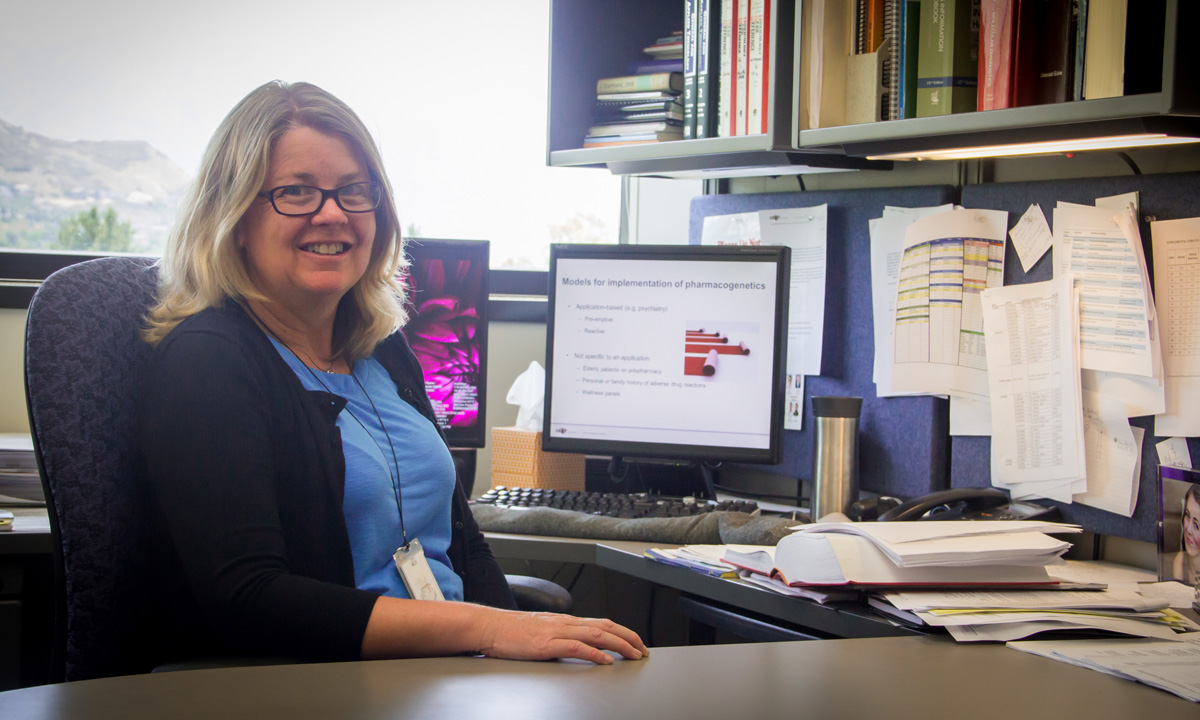
Dr. Gwen McMillin says ARUP's new therapeutic drug monitoring (TDM) for imatinib has definite patient benefits.
Fae helped deliver 500 calves last spring, one of many roles she plays in a Wyoming farm partnership with her husband, Jim.
But then she was diagnosed with leukemia, and had to put her work on hold.
Like others, Fae and Jim wanted health and targeted treatment. These days, with precision medicine that includes therapeutic drug monitoring (TDM), clinicians can use pharmacogenetics testing to evaluate whether a patient is or isn’t metabolizing a drug. TDM is used to optimize dose therapy to maintain a consistent concentration of drug in the patient's blood. The goal is to achieve that perfect balance of effective treatment while minimizing any risk for toxicity.
Clinicians traditionally have relied on a patient’s weight and height (body surface area, or BSA) to determine drug dosage. But BSA’s use is not backed by rigorous science.
“Any tool that can help improve success rates of therapy is exciting. But the potential benefit of imatinib TDM is three-pronged: [It can be used] to verify adherence of the drug; to optimize dose; and to troubleshoot variable pharmacogenetics.”
Gwen McMillin, PhD
Medical Director of Toxicology and Pharmacogenetics.
We all respond differently to substances regardless of our BSA. Some can eat sugar until bedtime without losing sleep; others must skip even a square of chocolate after 4 p.m. Each person metabolizes sugar, caffeine, or cancer drugs differently.
With chemotherapy drugs, differences in how we metabolize drugs can mean severe side effects for some patients, or cancer that refuses to retreat for others.
ARUP is now unique among commercial labs in providing TDM for imatinib, a drug usually taken in tablet form at home to treat chronic myelogenous leukemia (CML) and gastrointestinal stromal tumor (GIST). Imatinib is a tyrosine kinase inhibitor (TKI), meaning that it blocks enzymes called tyrosine kinases, which can be too active or found at high levels in some types of cancer cells. Blocking them may help keep cancer cells from growing.
“Any tool that can help improve success rates of therapy is exciting,” notes Gwen McMillin, PhD, ARUP medical director of Toxicology and Pharmacogenetics. “The potential benefit of imatinib TDM is three-pronged: [It can be used] to verify adherence of the drug; to optimize dose; and to troubleshoot variable pharmacogenetics.”
McMillin said the latter is relevant if a patient using imatinib begins taking an antibiotic or other medication that can interfere with the level of imatinib in the blood.
TDM can save a patient money, adds McMillin. Imatinib is the only generic TKI available, so patients who use TDM to optimize its dosage often end up spending less.
Imatinib is the first in a series of drugs used in cancer treatment for which ARUP is developing TDM tests.
Catherine Arnold, Science Communications Writer
Related Magnify magazine article (page 4)
"'Detectives' Discover More About the Accident Factor in Opioid Overdoses"
















